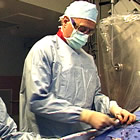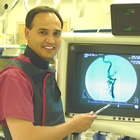Technology
Keeps Changing
Interventional cardiology is a relatively young and rapidly
evolving field of medicine. Minimally invasive treatment
of heart disease with catheter-based devices
(balloons, stents, etc.) began thirty years ago. Since that time the field
has grown exponentially, driven by technological innovation—by
the time one procedure reaches widespread usage, a new technology
comes along to replace it.
|
|
|
Physicians and
device manufacturers are eager to make new innovations available
to patients. Each new technology is an effort to make the treatment
of heart disease safer, less invasive or more effective. But
often it is not until a procedure goes into widespread use that
rare adverse events begin to show up, or long-term complications
with new technologies emerge. |
Background
Scary
Headlines
When problems with medical devices do surface, they quickly
make headlines. In 2004, 90,000 Boston Scientific Taxus
drug-eluting stents were recalled (for
detailed information on the recall, read our feature article, “Taxus
Stent Recall”). In 2006, after drug-eluting
stents had been in use for over 3 years, studies came out that indicated
a possible risk of dangerous blood clots, a year or more after stent implantation. When
patients who have received or are scheduled to receive a stent open their
morning newspaper and read reports of a recall, or possible
fatal blood clots,
it is understandably disconcerting. Their first thought: how does this affect
me? As Dr. Stephen J. Green, an interventional cardiologist at North Shore
University Hospital in Manhasset, New York, told Reuters
after the 2004 recall, “Patients
read the newspapers and watch TV...we [got] calls from patients on a daily
basis wanting to make sure they didn't get the Boston Scientific
stent.”
|
|

"Patients read the
newspapers
and watch TV..."
-- Stephen J. Green, MD
North Shore University Hospital, Manhasset NY |
The problem with the Taxus
stent was quickly identified and resolved —a handful of balloons
had failed to deflate due to structural defects. The number of
patients affected was extremely small, but for patients, the question
of what to do when this kind of event occurs is an important one.
In 2003, the Cypher™ coated stent, made by Johnson & Johnson,
was the subject of two warning letters from the FDA, also causing
much concern among patients, some of whom, fearing that the device
was defective, asked their doctors if it could be removed. (The
problem with the Cypher stent was not structural, but related to
emphasizing correct sizing by the physician and adequate post procedure
antiplatelet drug regimens for patients.)
 "This
is a breakthrough technology."
"This
is a breakthrough technology."
-- Felix Millhouse, MD
San Francisco Heart & Vascular Institute |
|
Physician Response
After the Taxus recall, Dr. Felix Millhouse of the San Francisco
Heart & Vascular
Institute at Seton Medical Center in San
Francisco concluded: "The company has done a good job identifying the
problem and fixing it.” Generally, although many had questions, physicians
were reassured by announcements from Boston Scientific regarding its actions
in the wake of
discovering the deflation problem.
Dr. Gregg Stone of Columbia Presbyterian
Hospital in New York told Angioplasty.Org, “They found a cause for it,
a very rare cause for it…they were able to fix it…they took the
responsible move to recall all the lots that even had a chance of having one-in-100,000
catheters affected…I am very comfortable continuing to use the product
as my primary stent.” |
Brigham and Women's Hospital in
Boston was reportedly one of the first to pull the Taxus
stents off its shelves
(they restarted its use two weeks later) but Dr. Donald
S. Baim told Angioplasty.Org that "the media sensationalized
this...it was not an issue if you had already gotten
a stent...and they only gave the numerator (95 non-deflations)
never the denominator (over a million cases)." He noted,
at that rate, his lab might have seen one problem in
50 years.
For patients, the situation is a bit more
complicated. They are less familiar with the science, so
it is difficult to understand the technical issues involved
in the design and manufacture of sophisticated medical devices.
Though extremely rare, non-deflation was potentially very
serious, potentially fatal. When it's your body, any implication
that a procedure may not be 100% safe is frightening. |
|

"It was not an issue
if you had already gotten a stent."
-- Donald S. Baim, MD
Brigham and Women's Hospital, Boston MA |
Guidelines

"you’re talking about
very rare events that might occur in one-out-of-a hundred
thousand patients"
-- Gregg W. Stone, MD
Columbia University Medical Center NY
|
|
Put rare problems in perspective
The Taxus stent, like all medical devices, was subject to extensive
trials and testing before being approved by the FDA. The Taxus
IV clinical trial involved 1,326 patients at 73 sites. Dr.
Gregg Stone, who was the chief investigator for that trial,
told Angioplasty.org, “I actually think it should almost be
anticipated that there are going to be problems that will arise
along the way, especially when you’re talking about very rare
events that might occur in one-out-of-a hundred thousand patients
or so, that you can’t possibly detect in a clinical trial.”
It was only after one million
Taxus stents had been implanted that reports surfaced of 95 confirmed
incidents of non-deflation with three resulting deaths. By contrast,
the odds of death resulting from routine general anesthesia are
one-in-200,000. Routine balloon angioplasty/stenting has a complication
rate of around one percent. All medical procedures carry a degree
of risk and it's very important to put risk in perspective. But
of course, it is essential to eliminate all preventable risks.
|
|
|
|
As of September 2006, researchers and regulators
are reviewing reports of possible late-stent thrombosis after drug-eluting
stenting.
Current estimates are that there is a 1 or 2 in 100 chance of late
stent thrombosis (a blood clot), a problem that can usually be
prevented by continuing anti-clotting medications.
Maintain
Healthy Skepticism
The FDA is currently reviewing its procedures for gathering and analyzing data
about adverse events after devices are approved and enter widespread use. The
truth is, companies and regulators sometimes fail to adequately follow-up over
the long term with patients and physicians in order to monitor the results
and side effects of procedures, drugs and medical devices. (Regulators are
investigating problems with the painkiller Vioxx and recalls of implantable
heart rhythm devices, for example.)
Physicians and the government are hesitant
to create unnecessary panic by announcing suspected problems
before they have been proven. Of course, companies don't
want to lose revenue by drawing attention to adverse events
and risks associated with devices. Patients
are understandably wary: for example, after the medical
profession dramatically reversed its decades-long practices
regarding hormone replacement therapy for menopausal
women, patients learned that studies are not always foolproof,
that medicine doesn’t always have all the answers.
|
Weigh Risk and Benefits
Most patients want to avail themselves of the best medical science
has to offer. Patients, with the help of their physicians,
should look at the risks/benefits of recommended treatments
and assess what is acceptable to them. It makes sense to stay
informed of medical news. Educated patients are in the best
position to discuss with their physicians whether a cardiology
procedure or device is appropriate for them.
By all means, look
at all the alternatives and at the medical thinking behind
the treatments that are recommended. If you are more comfortable
with an older,
more established procedure, discuss this with your physician. But no medical
intervention is entirely risk-free. It's a matter of deciding which risks are
more acceptable to you.
Dr. Gregg Stone states, “I think that the better
educated patients who can participate in their care will be more compliant with
treatment plans and
will ultimately do better.” This opinion is echoed by many, among them
Dr. Rajesh M. Dave of Harrisburg Hospital in Pennsylvania who told us, "It's
actually a much better thing for [patients] to know about the procedure and what
we are going to do and what they might expect, than if they don't know anything
and if there is ever a complication, it comes as a surprise to them."
Work with Your Physician
Patients today have access to complex medical information. Medical
issues are usually not black and white, and there are differences
in opinion among medical professionals regarding the efficacy
and advisability of numerous drugs and procedures.
Yet it is still the physician-patient relationship
that is key to obtaining quality healthcare. Folloqing are our
recommendations to patients who have questions regarding medical
devices and
procedures:
- Learn a bit about the science; it
can be reassuring to understand the specific nature of a
recall or safety problem
and how it
is being resolved. You can visit independent web pages like
this one. You can also review company web sites. And you can
look
at the FDA
site for
information on its policies, procedures and any current warnings
or recalls.
- Think about yourself,
consider your priorities and preferences. Try to find a doctor
who is willing
to make
decisions with
you. If you’re having trouble, try this interactive online
tool to help with healthcare decisions: https://decisionaid.ohri.ca/
- Ask
your doctor questions. Tell your doctor any specific technical
concerns you may have about a device. .Assure yourself
that your
doctor is up to date on the latest recommendations and practices
regarding use of a device or medicine. Discuss any concerns
you have about news reports.
Ask your doctor:
- Why have you chosen this
procedure/device for me?
- Why have you recommended this procedure
right now?
- What
is your experience with this procedure?
- What are the relative
risks and benefits of this procedure?
- What are my alternatives?
 "We
have seen a trend over the last six months...the majority
of the information is coming from the Internet."
"We
have seen a trend over the last six months...the majority
of the information is coming from the Internet."
-- Rajesh Dave, MD |
|
The physicians we interviewed
for this article agreed that when doctors clearly explain their
recommendations and answer patient questions, it results in
physician-patient trust and increased comfort with treatment
choices. These physicians are urging patients to go to the
web, to become informed and to ask questions so that they can
get the best healthcare possible.
Dr. Rajesh M. Dave told us, "We've seen a trend ...that
patients have been asking us to put in the newer coated stents
because they have heard a lot about it preventing restenosis...the
majority of the information is coming from the internet.
They are probably doing an ‘angioplasty’ search,
and there you go!" Dr. Dave believes this is a positive
trend, as does Dr. Stephen J. Green of North Shore, who told
Angioplasty.Org, “When I first started here, almost
25 years ago, it was, you know, respect the doctor. Don't
ask him questions. He knows what's right. And that whole
process has changed. And that's the right thing. It's an
informational age. It's appropriate for patients to know
what's going on, and I don't expect patients to be able to
be their own physician, but they can ask serious and reasonable
questions -- and they demand and should get reasonable answers.”
|
For the latest
news about developments in the field, go to our Drug-Eluting
Stent NewsCenter. We welcome your
comments on this article.
Source: Angioplasty.Org, September 8, 2004
-- revised October 6, 2004, September 14, 2006
CONTACT: Burt
Cohen, Producer of Angioplasty.Org
|

